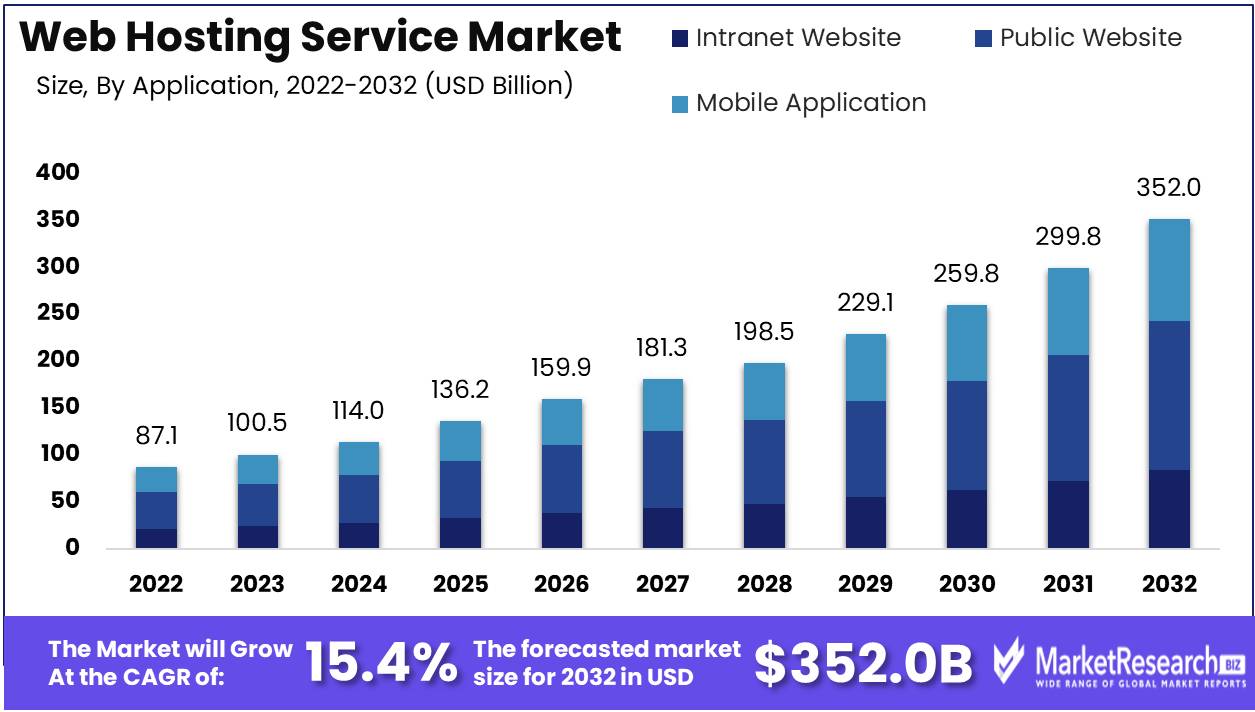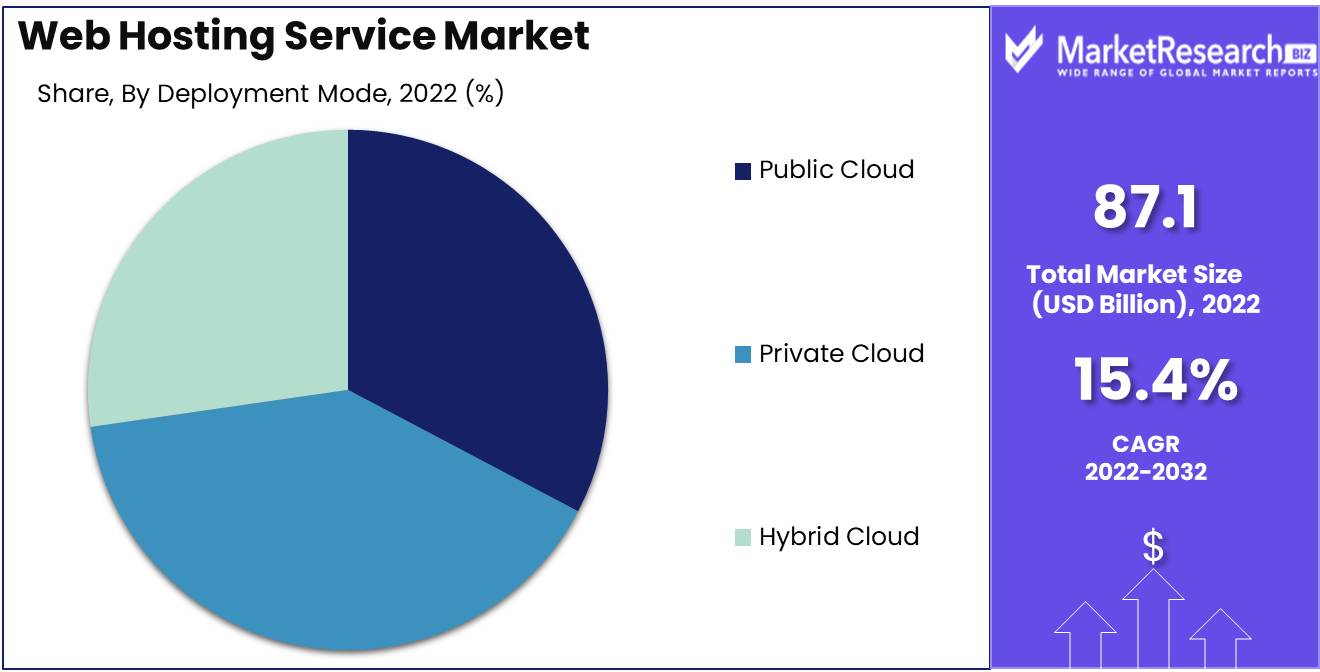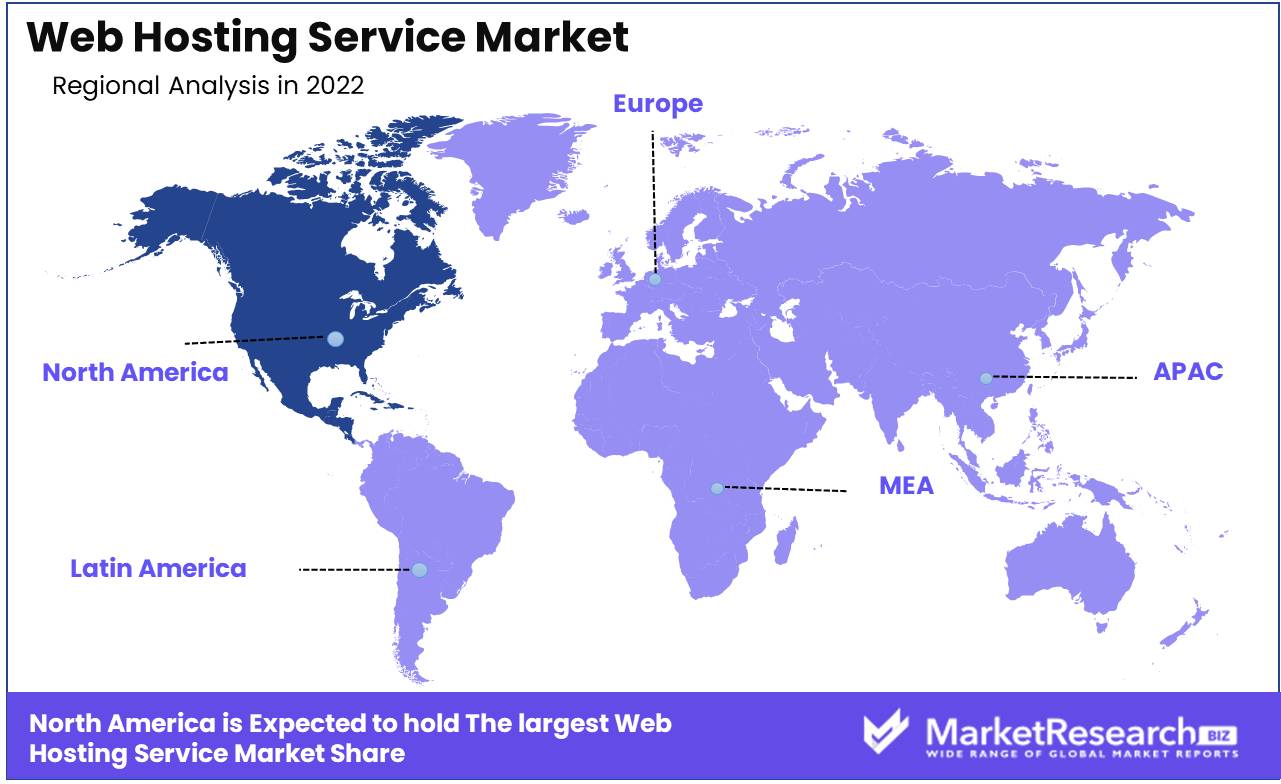
Web Hosting Service Market By Type (Shared Hosting, Dedicated Hosting, Virtual Private Server (VPS) Hosting, Other), By Application (Intranet Website, Public Website, Mobile Application), By Deployment Mode (Public Cloud, Private Cloud, Hybrid Cloud), By End-User, By Region And Companies - Industry Segment Outlook, Market Assessment, Competition Scenario, Trends, And Forecast 2023-2032
-
26946
-
March 2023
-
160
-
-
This report was compiled by Correspondence Linkedin | Detailed Market research Methodology Our methodology involves a mix of primary research, including interviews with leading mental health experts, and secondary research from reputable medical journals and databases. View Detailed Methodology Page
-
Report Overview
Web Hosting Service Market size is expected to be worth around USD 352.0 Bn by 2032 from USD 87.1 Bn in 2022, growing at a CAGR of 15.4% during the forecast period from 2023 to 2032.
In the contemporary digital landscape, the significance of web hosting services cannot be overstated, as they furnish individuals and enterprises with the necessary infrastructure to establish and maintain an online presence. The web hosting service market refers to the sector that offers individuals and organizations the technological and infrastructural resources required for hosting their websites and enabling internet accessibility. Commonly, these services encompass the provision of server space, allocation of bandwidth, and implementation of diverse maintenance and security attributes, thereby guaranteeing the continuous online presence and optimal functioning of websites.

Web hosting services facilitate the establishment of an online presence for website owners, allowing them to make their content readily available to a global audience of internet users. Web hosting services play a pivotal role in facilitating various digital operations, encompassing the management of personal journals, small-scale business websites, and expansive e-commerce platforms.
The importance of web hosting service market cannot be overstated, especially in a world that is becoming more interconnected, where businesses rely on an online presence for their success. These services offer a wide range of advantages, such as ensuring consistent uptime, facilitating scalability, enhancing security measures, and providing technical support. By utilizing a reliable web hosting service, individuals who own websites can guarantee that their sites will consistently be accessible to their intended audience. This ensures that user engagement and potential revenue generation are maximized.
In the realm of web hosting services, significant advancements have surfaced, consistently enhancing the overall user experience. The industry experienced a significant transformation with the introduction of cloud hosting, which provided hosting solutions that are characterized by flexibility, scalability, and cost-effectiveness. Cloud hosting is a technology that obviates the requirement for physical servers and allows websites to utilize a network of virtual servers, thereby ensuring optimal availability and performance.
The evolution of the web hosting service market is significantly influenced by ethical considerations. The escalating usage of the internet has raised concerns regarding the environmental implications associated with data centers, which serve as the backbone for web hosting services. Responsible providers of web hosting services acknowledge this concern and are actively working towards minimizing their environmental impact by reducing their carbon emissions. In order to mitigate their ecological footprint, the organization is adopting sustainable energy sources and allocating resources towards energy-efficient infrastructure.
Driving factors
Internet Penetration and Online Presence
In today's digital age, the internet has become an integral part of our daily lives. With increasing internet penetration and online presence, businesses are rapidly shifting their focus towards establishing a strong online presence. The explosive growth of the internet has opened up new horizons of opportunities for businesses, enabling them to reach a wider audience and showcase their products and services to potential customers worldwide. With the advent of numerous social media platforms and online marketplaces, businesses are no longer confined to operating solely in physical stores. This shift towards e-commerce and digital businesses has significantly transformed the way we shop, communicate, and conduct transactions.
Cloud Computing and Data Centers
Cloud computing has revolutionized the way businesses store, access, and manage data. Traditionally, data was stored on physical servers, which posed several limitations in terms of scalability, flexibility, and efficiency. However, with the advancements in cloud computing technology, businesses can now store their data in remote servers, providing a highly scalable and secure environment for their operations. Data centers play a crucial role in the realm of cloud computing, serving as the backbone that supports the storage, processing, and retrieval of large amounts of data. The expansion of data centers worldwide has strengthened the infrastructure necessary to handle the growing demand for cloud managed services.
Website Security and Reliability
As businesses transition towards a more digital-focused approach, the need for website security and reliability has become paramount. Cybersecurity threats are on the rise, with hackers constantly seeking vulnerabilities to exploit. With cyber attacks becoming increasingly sophisticated, businesses face the risk of reputation damage, financial loss, and compromised customer data if their websites are not adequately protected. Hence, businesses are investing in robust security measures to safeguard their websites from potential breaches. This includes implementing SSL certificates, firewalls, intrusion detection systems, and regular security audits.
Managed Hosting and Scalable Infrastructure
The web hosting service market has witnessed substantial growth in recent years, driven by the rising demand for managed hosting and scalable infrastructure. Managed hosting services provide businesses with a comprehensive solution, taking care of all technical aspects, including server management, security updates, backups, and performance optimization. This allows businesses to focus on their core competencies without the burden of managing complex hosting infrastructure. Scalable infrastructure is another crucial factor driving the demand for web hosting services.
Restraining Factors
Potential Price Competition and Commoditization
One of the key challenges faced by web hosting service providers is potential price competition and commoditization. With the increasing number of players in the web hosting service market, the competition has intensified, leading to a downward pressure on prices. To combat these challenges, web hosting service providers should focus on value differentiation rather than engaging in a race to the bottom in terms of pricing. By offering unique features or specialized services that cater to specific customer segments, providers can set themselves apart and command higher prices based on the value they deliver.
Concerns over Data Privacy and Security
In today's data-driven world, concerns over data privacy and security have become paramount. Customers are increasingly cautious about sharing sensitive information online, and any breach of security can severely impact a web hosting service provider's reputation. As cyber threats continue to evolve, addressing these concerns is crucial to maintaining trust and sustaining growth in the web hosting service market. Web hosting service providers need to invest in robust security measures and technologies to safeguard customer data. Encrypting data, implementing network security firewalls, and regularly updating protocols are essential steps to ensure data privacy and mitigate potential security risks.
Challenges in Technical Support and Customer Service
In the competitive web hosting service market, technical support and customer service play a vital role in attracting and retaining customers. When faced with technical issues or concerns, customers expect prompt and effective resolution from their service providers. However, delivering high-quality technical support can be challenging, particularly for providers with a large customer base. To address this challenge, web hosting service providers should invest in building a strong technical support team. This includes hiring proficient technical experts, organizing regular training sessions to enhance their knowledge base, and implementing comprehensive ticketing systems to streamline customer queries and resolutions.
DIY Website Building Platforms
Do-it-yourself (DIY) website building platforms have gained popularity in recent years. These platforms offer users an easy and cost-effective way to create and manage their websites without the need for extensive technical expertise. While this trend provides convenience to individuals and small businesses, it poses a potential threat to traditional web hosting service providers. In response, web hosting service providers can adapt their business models to incorporate partnerships or integrations with DIY website building platforms. By offering bundled packages or seamless integration options, providers can add value to their services and remain relevant in the web hosting service market.
Type Analysis
Shared Hosting Segment dominates web hosting service market. The web hosting service market is experiencing significant growth, with the shared hosting segment dominating the industry. Shared hosting is a popular choice among businesses and individuals as it provides a cost-effective solution for hosting websites. In shared hosting, multiple websites are hosted on a single server, sharing its resources and costs. The dominance of the shared hosting segment can be attributed to several factors. Cost-effectiveness plays a crucial role in its popularity. Shared hosting allows businesses to share the expenses of server maintenance and infrastructure, resulting in lower costs compared to other hosting options.
Consumer trends and behavior play a vital role in shaping the web hosting service market. In the case of shared hosting, consumers are increasingly gravitating towards this segment due to its affordability and convenience. One consumer trend observed in the shared hosting segment is the migration of small businesses and individuals from traditional hosting options to shared hosting. This shift is primarily driven by the lower costs associated with shared hosting and the desire to have an online presence without investing significant resources.
Application Analysis
The Public Website segment continues to dominate the consumer trends in the digital landscape. As more businesses and organizations strive to establish a strong online presence, public websites have become a critical tool for engaging with customers and stakeholders. Companies across various industries are increasingly focusing on creating user-friendly, visually appealing, and content-rich websites to attract and retain visitors. With the rise of e-commerce and online services, consumers now expect seamless experiences when interacting with public websites, from intuitive navigation to responsive design.
In the realm of Consumer trends, there is a growing emphasis on user-generated content and social interactions. Consumers today not only seek information and products from public websites but also actively participate in discussions, reviews, and feedback. This trend has given rise to social media integration and interactive features on websites, enabling users to share their experiences and opinions. Consumers are increasingly concerned about data privacy and security, prompting businesses to prioritize secure online transactions and transparent data handling practices.
Deployment Mode Analysis
The Consumer trends in the Deployment Mode indicate a significant preference for the Public Cloud segment. Public cloud services offer scalability, cost-effectiveness, and accessibility, making them highly attractive to businesses and consumers alike. As data volumes and computing demands increase, the public cloud provides a flexible solution, allowing organizations to adapt to changing needs without significant upfront investments.
The increasing popularity of Software-as-a-Service (SaaS) offerings has contributed to the dominance of the Public Cloud segment. Consumers prefer the convenience of accessing software applications through the cloud, eliminating the need for local installations and updates. This trend aligns with the growing mobile workforce and the prevalence of remote work arrangements. Additionally, the Public Cloud's shared infrastructure model promotes collaboration and information sharing, enhancing productivity and connectivity among consumers.

Key Market Segments
By Type
- Shared Hosting
- Dedicated Hosting
- Virtual Private Server (VPS) Hosting
- Colocation Hosting
- Other Types
By Application
- Intranet Website
- Public Website
- Mobile Application
By Deployment Mode
- Public Cloud
- Private Cloud
- Hybrid Cloud
By End-User
- Enterprise
- Individual
Growth Opportunity
Embracing Artificial Intelligence
As technology advances at an unprecedented pace, the utilization of Artificial Intelligence (AI) holds vast potential in shaping the future of web hosting services. By leveraging AI-powered tools and systems, hosting providers can enhance their service offerings and streamline operations. AI algorithms can help optimize server performance, improve data security, and automate various tasks such as customer support, resource allocation, and system maintenance.
Harnessing the Power of Edge Computing
In recent years, the concept of edge computing has gained prominence, transforming the way data is processed and delivered. Edge computing involves deploying computer resources closer to the source of data generation, reducing latency and enhancing performance. By incorporating edge computing technologies in their infrastructure, web hosting service providers can offer faster, more reliable, and efficient services to their clients. This approach not only benefits businesses requiring real-time data processing capabilities but also creates opportunities for innovation and customization in web hosting services for specific industries or applications.
Leveraging Blockchain Technology
Blockchain technology, initially known for its association with cryptocurrencies, has now emerged as a powerful tool for securing digital transactions, data, and identities. In the realm of web hosting services, integrating blockchain technology can revolutionize data security and privacy. By incorporating blockchain-based solutions, hosting providers can offer their clients a tamper-proof and decentralized infrastructure, ensuring the integrity of websites and protecting sensitive information.
Latest Trends
Cloud Hosting and Infrastructure-as-a-Service (IaaS)
One of the most significant market trends in recent years is the rapid growth of cloud hosting and Infrastructure-as-a-Service (IaaS) solutions. With the increasing reliance on digital infrastructure, businesses are looking for flexible, scalable, and cost-effective hosting options that can meet their evolving needs. Cloud hosting and IaaS provide a compelling solution, allowing businesses to leverage the power of virtualized computing resources on-demand. By adopting cloud hosting and IaaS, businesses can reduce IT infrastructure costs, improve scalability, and ensure high availability for their websites and applications.
Managed WordPress and E-commerce Hosting
Another major web hosting service market trend driving the web hosting services industry is the increasing demand for managed WordPress and e-commerce hosting solutions. As the popularity of WordPress as a content management system (CMS) continues to soar, businesses are seeking specialized hosting services tailored for optimizing the performance and security of their WordPress websites. Managed WordPress hosting providers offer a range of services, including automatic updates, advanced security measures, expert support, and performance optimization.
Content Delivery Networks (CDNs)
In today's fast-paced digital world, website performance has become a crucial factor in attracting and retaining visitors. Slow-loading websites not only frustrate users but also negatively impact search engine rankings. To address this issue, the utilization of Content Delivery Networks (CDNs) has emerged as a popular web hosting service market trend in the web hosting services industry. CDNs help improve website performance by distributing content across a network of servers located in different geographic locations. By leveraging CDNs, businesses can reduce loading times, enhance user experience, and boost their website's search engine visibility.
Hybrid and Multi-Cloud Hosting Solutions
The rise of hybrid and multi-cloud hosting solutions is another important web hosting service market trend that is shaping the web hosting services industry. While cloud hosting offers numerous benefits, some businesses prefer to distribute their workloads across multiple cloud providers or combine cloud infrastructure with dedicated servers for increased control and customization. Hybrid hosting allows businesses to achieve the best of both worlds by combining the scalability and flexibility of the cloud with the security and reliability of dedicated servers. Multi-cloud hosting, on the other hand, enables businesses to leverage multiple cloud providers to minimize dependency and enhance redundancy.
Cybersecurity and SSL Certifications
With cyber threats becoming more sophisticated and widespread, cybersecurity and SSL certifications have become paramount in the web hosting services industry. Businesses and website owners are increasingly concerned about protecting their online assets, sensitive data, and customer information. Web hosting providers that prioritize cybersecurity and offer SSL certifications are gaining a competitive advantage in web hosting service market. SSL certifications not only provide a secure connection between websites and users but also positively impact search engine rankings.
Regional Analysis
North America Region Dominates the web hosting service market. In today's ever-evolving digital landscape, web hosting services play a pivotal role in ensuring that websites are accessible and available to users across the globe. The web hosting industry has seen exponential growth in recent years, providing businesses and individuals with the platform they need to establish their online presence. When it comes to dominating this dynamic web hosting service market, the North America region emerges as a formidable force, spearheading technological advancements and setting the bar high for others to follow.
The North America region, encompassing countries such as the United States and Canada, boasts a robust infrastructure that has revolutionized the web hosting service market. With its vast resources, advanced technological capabilities, and a thriving entrepreneurial spirit, this region has established itself as a key player in the industry. The high demand for web hosting services in North America can be attributed to several factors, including its booming e-commerce sector, technological innovation, and a widespread internet penetration rate.
North America region's dominance in this industry. As businesses strive to establish their online presence, the need for reliable and efficient web hosting services has skyrocketed. This surge in demand has led to fierce competition among web hosting providers, pushing them to constantly improve and innovate their offerings. Consequently, North American companies have been at the forefront of this race, continuously raising the bar and setting industry standards. The North America region's domination of the web hosting service market can also be attributed to its highly skilled workforce.

Key Regions and Countries
North America
- US
- Canada
- Mexico
Western Europe
- Germany
- France
- The UK
- Spain
- Italy
- Portugal
- Ireland
- Austria
- Switzerland
- Benelux
- Nordic
- Rest of Western Europe
Eastern Europe
- Russia
- Poland
- The Czech Republic
- Greece
- Rest of Eastern Europe
APAC
- China
- Japan
- South Korea
- India
- Australia & New Zealand
- Indonesia
- Malaysia
- Philippines
- Singapore
- Thailand
- Vietnam
- Rest of APAC
Latin America
- Brazil
- Colombia
- Chile
- Argentina
- Costa Rica
- Rest of Latin America
Middle East & Africa
- Algeria
- Egypt
- Israel
- Kuwait
- Nigeria
- Saudi Arabia
- South Africa
- Turkey
- United Arab Emirates
- Rest of MEA
Key Players Analysis
To develop their online presence and manage their digital operations effectively, modern businesses rely largely on web hosting services. As web hosting services become more popular, it's important to study the web hosting service market leaders. We shall analyze Amazon Web Services (AWS), Microsoft, Check Point Software Technologies Ltd., Google LLC, Palo Alto Networks, and McAfee LLC in this post. We'll examine the web hosting titans.
AWS's cloud infrastructure services have transformed web hosting for organizations. Amazon Elastic Compute Cloud (EC2), Amazon Simple Storage Service (S3), and Amazon Relational Database Service (RDS) enable enterprises to extend operations efficiently and cost-effectively. AWS provides secure, reliable, and scalable solutions to the web hosting sector with its global infrastructure.
Microsoft Azure, its enterprise-grade cloud platform, dominates the web hosting service market. Virtual Machines, Azure App Service, and Azure SQL Database help businesses build, deploy, and manage applications with Azure's wide variety of tools and services. Microsoft's focus on security, compliance, and hybrid capabilities makes them a dependable partner for organizations of all sizes to leverage the cloud.
Check Point Software Technologies Ltd. protects web hosting services in a cybersecurity-focused world. As a premier cybersecurity provider, its technologies reinforce web hosting infrastructures against evolving threats, enabling organizations to function securely and preserve critical data. Check Point's network, cloud, and mobile security products protect the web hosting business.
GCP has quickly become a stable and scalable web hosting solution. Businesses can improve their web hosting services by using Google's solid infrastructure and cutting-edge technologies like AI and machine learning. GCP's Compute Engine, Google Kubernetes Engine, and Cloud Storage services enable enterprises to grow easily while benefiting from Google's network and innovation.
Palo Alto Networks is a leader in advanced web security solutions for web hosting services. Their firewalls, cloud security, and threat intelligence solutions help enterprises prevent cyberattacks. Palo Alto Networks continuously innovates to protect web hosting infrastructures.
McAfee LLC, a cybersecurity giant, offers many web hosting security solutions. McAfee's integrated security platform protects web applications, data, and endpoints while ensuring operational efficiency. McAfee solves web hosting security issues with automation and powerful analytics, making them a market leader.
Top Key Players in Web Hosting Services Market
- Amazon Web Services,Inc. (U.S.)
- Microsoft (U.S.)
- Check Point Software Technologies Ltd.(U.S.)
- Google LLC (U.S.)
- Palo Alto Networks. (U.S.)
- McAfee LLC. (U.S.)
- IBM (U.S.)
- Zscaler Inc. (U.S.)
- Cisco Systems Inc. (U.S.)
- Fortinet Inc. (U.S.)
- Sophos Ltd. (U.K.)
- Foreseeti (Sweden)
- Broadcom. (U.S.)
- Trend Micro Incorporated. (Japan)
- Tenable,Inc. (U.S.)
- Forcepoint (U.S.)
- Imperva. (U.S.)
- Proofpoint. (U.S.)
- Cloudflare,Inc (U.S.)
- Aqua Security Software Ltd. (Israel)
- Qualys,Inc. (U.S.)
- Konverge (U.S.)
- Bitglass,Inc. (U.S.)
- SiteLock (U.S.)
Recent Development
- GoDaddy (2023): Unveiled plans for an innovative web hosting service designed specifically for small businesses. The service promises to empower budding ventures with cutting-edge features, seamless user experiences, and robust security measures.
- HostGator (2023): Announced a significant expansion of its data centers. The move demonstrates HostGator's commitment to delivering top-tier hosting solutions by investing in state-of-art technology and expanding its server capacity.
- Bluehost (2023): Acquired HostPapa, a leading provider of web hosting services. The acquisition marks a significant move by Bluehost to further solidify its market presence and expand its service offerings.
- A2Hosting (2023): Launched a state-of-the-art web hosting service designed specifically to address the needs of websites with heavy traffic loads. The solution ushers in a new era of performance and efficiency by harnessing advanced technologies and optimizing server configurations.
Report Scope
Report Features Description Market Value (2022) USD 87.1 Bn Forecast Revenue (2032) USD 352.0 Bn CAGR (2023-2032) 15.4% Base Year for Estimation 2022 Historic Period 2016-2022 Forecast Period 2023-2032 Report Coverage Revenue Forecast, Market Dynamics, COVID-19 Impact, Competitive Landscape, Recent Developments Segments Covered By Type (Shared Hosting, Dedicated Hosting, Virtual Private Server (VPS) Hosting, Colocation Hosting, Other Types)
By Application (Intranet Website, Public Website, Mobile Application)
By Deployment Mode (Public Cloud, Private Cloud, Hybrid Cloud)
By End-User (Enterprise, IndividualRegional Analysis North America – The US, Canada, & Mexico; Western Europe – Germany, France, The UK, Spain, Italy, Portugal, Ireland, Austria, Switzerland, Benelux, Nordic, & Rest of Western Europe; Eastern Europe – Russia, Poland, The Czech Republic, Greece, & Rest of Eastern Europe; APAC – China, Japan, South Korea, India, Australia & New Zealand, Indonesia, Malaysia, Philippines, Singapore, Thailand, Vietnam, & Rest of APAC; Latin America – Brazil, Colombia, Chile, Argentina, Costa Rica, & Rest of Latin America; Middle East & Africa – Algeria, Egypt, Israel, Kuwait, Nigeria, Saudi Arabia, South Africa, Turkey, United Arab Emirates, & Rest of MEA Competitive Landscape Amazon Web Services,Inc. (U.S.), Microsoft (U.S.), Check Point Software Technologies Ltd.(U.S.), Google LLC (U.S.), Palo Alto Networks. (U.S.), McAfee LLC. (U.S.), IBM (U.S.), Zscaler Inc. (U.S.), Cisco Systems Inc. (U.S.), Fortinet Inc. (U.S.), Sophos Ltd. (U.K.), Foreseeti (Sweden), Broadcom. (U.S.), Trend Micro Incorporated. (Japan), Tenable,Inc. (U.S.), Forcepoint (U.S.), Imperva. (U.S.), Proofpoint. (U.S.), Cloudflare,Inc (U.S.), Aqua Security Software Ltd. (Israel), Qualys,Inc. (U.S.), Konverge (U.S.), Bitglass,Inc. (U.S.), SiteLock (U.S.) Customization Scope Customization for segments, region/country-level will be provided. Moreover, additional customization can be done based on the requirements. Purchase Options We have three licenses to opt for: Single User License, Multi-User License (Up to 5 Users), Corporate Use License (Unlimited User and Printable PDF) -
-
- Amazon Web Services,Inc. (U.S.)
- Microsoft (U.S.)
- Check Point Software Technologies Ltd.(U.S.)
- Google LLC (U.S.)
- Palo Alto Networks. (U.S.)
- McAfee LLC. (U.S.)
- IBM (U.S.)
- Zscaler Inc. (U.S.)
- Cisco Systems Inc. (U.S.)
- Fortinet Inc. (U.S.)
- Sophos Ltd. (U.K.)
- Foreseeti (Sweden)
- Broadcom. (U.S.)
- Trend Micro Incorporated. (Japan)
- Tenable,Inc. (U.S.)
- Forcepoint (U.S.)
- Imperva. (U.S.)
- Proofpoint. (U.S.)
- Cloudflare,Inc (U.S.)
- Aqua Security Software Ltd. (Israel)
- Qualys,Inc. (U.S.)
- Konverge (U.S.)
- Bitglass,Inc. (U.S.)
- SiteLock (U.S.)




